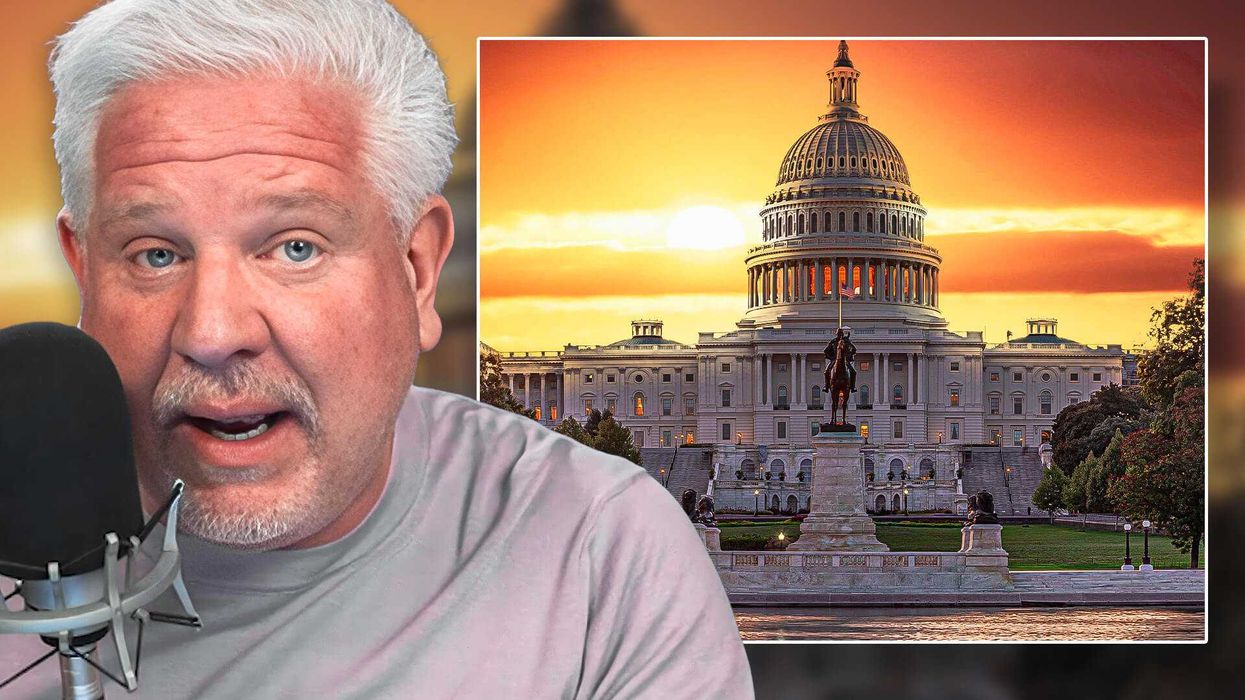
© 2025 Blaze Media LLC. All rights reserved.
The Fourth Circuit Court has nullified national sovereignty, but nobody in the political chattering class has answered the most important question: Why should Trump listen and what exactly is he supposed to do (or not do) in abiding by this opinion? There is no valid case or controversy to follow.
What distinguishes a court from a legislature
If Rep. Louie Gohmert, R-Texas, or Sen. Rand Paul, R-Ky., were to don black robes tomorrow and issue judicial orders on flagrantly political issues, would we expect the other branches of government to treat them as the final law of the land – binding over the other two branches of government – more so than when they were sitting in their respective legislative chambers?
Of course not. The other branches, especially if controlled by Democrats, would discard their judicial “opinions” immediately.
Yet, that is – including lower-court judges created by Congress, and not even the Constitution – now having the final say over national sovereignty, immigration, and national security.
Consider this irrationality: Congress can pass a law along party lines, yet we won’t regard that as the law of the land until a court upholds it. Yet, a court can be split along the same party lines – and is unelected and unaccountable – but somehow that is given MORE legitimacy than a legislature.
That’s exactly Thursday in the Fourth Circuit Court of Appeals when 10 Democrat appointees “voted” against Trump’s temporary immigration moratorium, while the three GOP appointees voted for it.
Why not just have elected partisan officials decide political matters instead of unelected ones?
And therein lies the nub of this case. What differentiates a court from a legislature, what prevents the judiciary from becoming a de facto veto over the other two branches on broad national policy – and now even international policy – rather than serving as a separate co-equal branch, is that it can only adjudicate an individual case or controversy with legitimate standing and redressable grievances.
But the notion that their opinion in that individual case would be regarded as binding precedent on a national policy without any opposition is absurd; it philosophically undermines the premise of republican government, checks and balances, and co-equal branches.
Even those who believed in more robust judicial power always assumed that issues of national sovereignty and national security dealing with foreign nationals was beyond the reach of the court. In fact, it was considered settled law for over 100 years.
No standing on second Trump immigration order
In the case before the Fourth Circuit, there was no legitimate case or controversy. There is nothing for Pres. Trump to abide by. As Judge Steven Agee noted in his dissent, the three plaintiffs don’t have valid standing.
Even if we cede the absurd premises (see links below for more on this issue) that American relatives can sue to bring in foreign nationals, that the courts have the right to overturn sovereignty — and that the Establishment Clause applies to hypothetical immigrants — there is no redressable grievance. None of the plaintiffs were actually denied entry.; they merely feared the stigma of Trump’s declaration.
Thus, what relief did the courts grant in this case? And to whom? They can’t “strike down” an executive guidance. They don’t have such power — it has to apply to a tangible case.
Judge Agee explained the conditions for valid standing that differentiates the judicial power from legislative or executive powers as follows:
(1) “the plaintiff must have suffered an injury in fact—an invasion of a legally protected interest which is (a) concrete and particularized, and (b) actual or imminent, not conjectural or hypothetical”; (2) “there must be a causal connection between the injury and the conduct complained of—the injury has to be fairly traceable to the challenged action of the defendant, and not the result of the independent action of some third party not before the court”; and (3) “it must be likely, as opposed to merely speculative, that the injury will be redressed by a favorable decision.”
In this case, two of the plaintiffs are Iranian LPRs (lawful permanent residents, i.e. green card holders) who want to bring over their wives from Iran. Both should never have standing (over and beyond the obvious reasons ignored by the courts) because the wife of John Doe No. 1 was never denied yet and her application is still in process, and John Doe No. 3’s wife was actually approved!
Why are they suing? Because they are “being torn apart by this situation and the uncertainty and delay” and the stress and anxiety of feeling like “an outsider.” Thus, there is absolutely no injury-in-fact, even if we agreed foreign nationals somehow have a right to immigrate to America!
Moreover, even if there was a valid case, there is no tangible application of this case that would make the court’s opinion tantamount to “striking down” the policy.
For example, in the first round of litigation on the original order, while the courts were still way out of line, there was a tangible outcome for the Trump administration to follow. They allowed in anyone with a valid visa who was stuck at the airport. But in this case, we are talking about hypothetical future immigrants.
The courts are saying you can’t categorically deny visas from nationals of the listed countries. OK … but what should Trump affirmatively do? Does he now have to bring in everyone? Does he have to bring in the same ratio as any other country?
During every day of every administration, the DHS and State Department deny visas for all sorts of discretionary reasons. There’s no way a court can categorically ban the action of denying visas. So, under which circumstances may the president deny any visa? There is no way to know, which is why he should continue following statute.
Moreover, as I mentioned Thursday morning, as it relates to refugees the court opinion doesn’t make any sense at all. The refugee moratorium wasn’t applied only to “Muslim” countries; it was applied to everyone. So, the plaintiff in this case who had a relative applying for refugee status (this was the third plaintiff, Muhammed “John” Meteab) doesn’t even have a valid Establishment Clause claim, even under their crazy system.
Plus, in this case, the applications for the relatives of this plaintiff were actually approved! So what’s the beef? Meteab claims he “experienced anti-Muslim sentiment and felt very uncomfortable and insecure in their community, causing them acute mental stress.”
But even if we agree with the court that the president, who has full control to set the refugee cap, suddenly cannot categorically shut down refugee resettlement, what exactly is he supposed to do? Does he bring in 50,000 a year … 70,000 … 100,000? How much is “enough”?
Furthermore, parts of the Fourth Circuit Court’s opinion are null and void on their face. As it relates to non-immigrant visas from four of the six countries, 8 U.S. Code §1735 requires the president to cut off visas to state sponsors of terrorism, which at the time of passage in 2002, included five of the seven countries in Trump’s original order.
Thus, there is no excuse for Trump’s secretary of state or DHS secretary not to continue passively denying visas or refugee status to their heart’s content. This is not the same as advocating “not listening to the courts.” (Although that is something that needs to happen anyway, because the courts don’t listen to statutes and the Constitution.) It’s to say that there is no affirmative action to take in accordance with a court order because there is no order and a court can’t issue such an order.
The Trump administration should at least wait for the ACLU to launch another challenge and try to prove that the White House is in some way violating the order. But, in order to do so, they would have to challenge an actual denial of a visa. The problem is that 8 U.S. Code §1201(h)(i) gives customs officers the plenary authority to not only deny issuance of a visa but to revoke one already issued.
What’s more, this provision of law, which passed the Senate 96-2 in 2004, explicitly stripped the courts of any jurisdiction to adjudicate the revocation of visas for anyone seeking entry into the country (as opposed to someone living here who is being deported). The jurisdiction-stripping provision includes even a basic habeas corpus petition. How in the world can the courts be allowed to get involved in this matter?
Perforce, the “executive order” is not a tangible law because the law already gives the executive branch such authority. If the courts are merely saying that Trump can’t make a public declaration that makes American Muslims feel stigmatized (which is essentially the only way they granted standing in this case), then Trump should just rip up the order but proceed to quietly adhere to more or less the same policies.
Any complaints about such a move would, by definition, make the courts a legislature, not a judicial body. And if we can’t , we are no longer a republic worth defending.
Read more
- The appalling hypocrisy, ignorance of courts on immigration and states' rights
- The full case for why courts have no jurisdiction over Trump's immigration order
- Impeach Judge James Robart for violating sovereignty and Constitution
- How to tell the difference between Trump and Obama's refugee EOs? Trump actually follows the law
- Rogue judges undermine our sovereignty. Here's how Congress can stop them.
- These 16 quotes prove America can exclude or deport any immigrant … for any reason
- These 73 sitting Democrats voted to ban visas from some Muslim countries. That law still exists
- Just how radical was the Ninth Circuit’s nullification of law?
- 7 statutes that CLEARLY support Trump’s immigration executive order
- Today our national sovereignty is on trial in fake courts
Want to leave a tip?
We answer to you. Help keep our content free of advertisers and big tech censorship by leaving a tip today.
Want to join the conversation?
Already a subscriber?
Blaze Podcast Host
Daniel Horowitz is the host of “Conservative Review with Daniel Horowitz” and a senior editor for Blaze News.
RMConservative
Daniel Horowitz
Blaze Podcast Host
Daniel Horowitz is the host of “Conservative Review with Daniel Horowitz” and a senior editor for Blaze News.
@RMConservative →more stories
Sign up for the Blaze newsletter
By signing up, you agree to our Privacy Policy and Terms of Use, and agree to receive content that may sometimes include advertisements. You may opt out at any time.
Related Content
© 2025 Blaze Media LLC. All rights reserved.
Get the stories that matter most delivered directly to your inbox.
By signing up, you agree to our Privacy Policy and Terms of Use, and agree to receive content that may sometimes include advertisements. You may opt out at any time.






